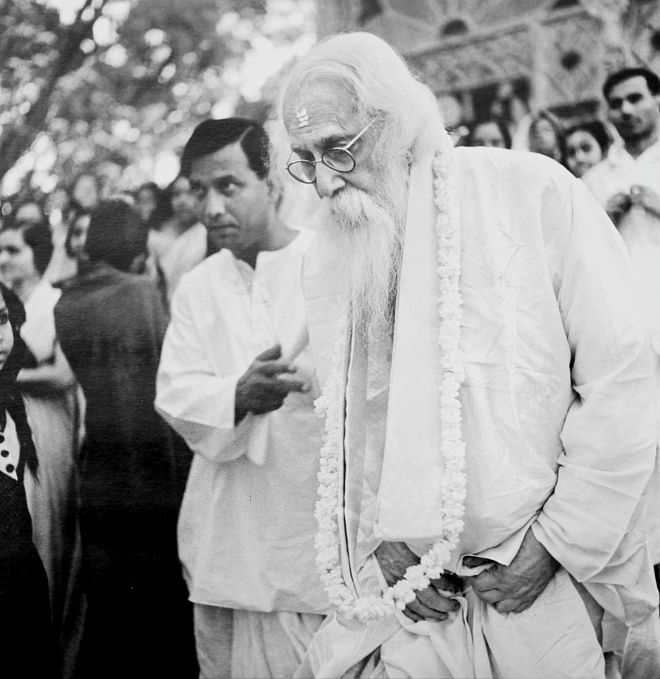Rabindranath touches a chord . . .
Rabindranath touches a chord . . .

In Rabindranath is a perpetual reminder of Bengal. Yes, there is the cosmopolitan about him, the modernity that defines poetry in our times. What Neruda is to Latin America and Lorca is to Spain and Goethe is to German literature, Rabindranath is to the world that I endlessly rediscover, because the Bard is constantly reinventing it through his poetry. And poetry is in his songs. My day begins with his music, through drifting along in the melody that underpins our lives, Rabindranath's melody.
And life is but a purposeful definition of love, of romance. In the laughter of the woman who causes new poetic sensibilities to arise in my soul every time she waltzes into the room, in the silence which descends on her all day long, it is the song that matters. Through aami tomar shonge bedechhi amar praan, passion assumes wider dimensions and love is rekindled in the heart. I serenade this woman. I celebrate her, as I hum tomaye gaan shonabo / tai to amaye jagiye rakho.
Rabindranath touches a chord, somewhere and everywhere. He is a throbbing presence in my understanding of the roots I have sprung from, the roots that clutch, the roots that will call me back to earth. Those roots are the land, this country, which has through the centuries endured myriad degrees of pain and yet has refused to genuflect before fate or the terror periodically unleashed by unbridled nature. In the stillness of descending daylight, I watch the rising silhouettes of the huts and the palm trees in my village. The village is my country, larger and wider and of universal dimensions. The strains of O amar desher mati tomar porey thekai matha rise across the landscape, even as the early stars climb the heights to the heavens.
My Rabindranath is a soft call, almost in the manner of a whisper, to things mystical. Creation, along with the wonders that give it profundity of meaning, shines in the greyness enveloping the gently flowing river, in the waters that have flowed since time immemorial. I sing nodi pare ei Asharhe. And I follow it up with aaji shaanjher Jamuna-e go / toruno chander kirono tori bheshe jaaye go. When I reflect on Rabindranath, I appear to be getting drawn, yet again, into the wider philosophy of life he epitomizes through his songs, indeed through the art and the aesthetics he pumped into Bengali literature through a life that spanned eight decades.
There is fullness in Rabindranath, a comprehensive life which borrowed from the universe around it and then reshaped and redefined what it had borrowed, before coming forth with it all as an offering to the cosmos we call home. He was a whole lot more than a poet, a maker of songs. He saw the world around him and then preserved it in the rainbow colours of his art. In his work with wood, it was again primordial beauty more than the physicality of objects which emerged from the infinite creativity that was Rabindranath.
My Rabindranath speaks to me of the wonders of the wider world outside my window. He takes me to distant China, the distance being of the times gone by, a world that came encapsulated in the second decade of the twentieth century. I hear him expound on the nature of life and the character of death as he treks through Japan. In my Rabindranath is, curiously, a reminder of Yeats, for both men knew each other. Larger than that truth is the depths to which they were willing to go in creating new dreams and reviving old ones from the bed of time's gurgling, often riotous sea.
Rabindranath for me is a lesson on the need for patriotism, a guide on the limits to which nationalism can go in assessments of history. He speaks of the religion of man. Because he does, I find God in the church, in the temple, in the mosque. Because he does, God manifests Himself in the pouring rain, in the fall of a star, in the slow rise of the moon across a nocturnal sky, in the frantic struggle of the sun to peep through dense monsoon clouds. God is in the fragrance of the beautiful woman who holds my hand, whose face I caress, in the brevity of a moment. God lives in Rabindranath's soul. God reminds me of my place in the universe, as a leaf stirs on a listless afternoon. Ripples in the pond break into beautiful games, in the manner of so many children breaking into baby laughter.
My Rabindranath teaches me, every livelong day, the meaning of life lived in courage. Because of him, the mind is without fear, the head is forever unbowed.